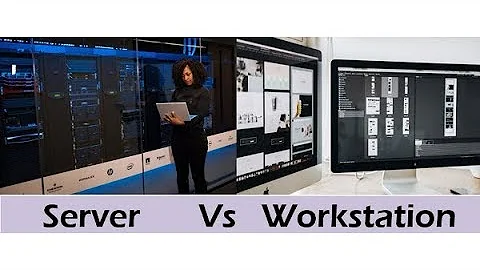How come Core i7 (desktop) dominates Xeon (server)?
Solution 1
When selecting a CPU architecture for a web-server, you do need to know what you're doing with the server itself. Only you can tell if what you're doing can take advantage of multiple cores, or if it is solidly single-threaded. PassMark's PerformanceTest product test distils CPU performance down to a single number, yet what you're doing with your web-server is (likely) going to be a small subset of the CPU's overall capabilities.
Webservers tend to involve quite a bit of integer maths in what they do, though your application code will make all the difference. Secondly, webserver processes usually parallelize well (though not always, app-code makes a big difference here too). Because of this, they can exercise a CPU in ways that desktop-usage rarely does.
Now for your specific question.
The i7-2600 and E3-1245 are priced similarly according to MSRP, though they are aimed at different market-segments. The i7 is the top-tier Desktop part, where the E3 is the value Server part. Both chips are aimed at high-clock, low core environments. That said, the E3 is designed to work with other CPUs in the same system, so the benefits of the CPU stack when you use a dual-socket motherboard.
The top-end of the Server segment is the E7 line. The E7-4870 isn't in the PassMark database, but looking at the spec-sheet you can see how different it is. It has much lower clock than the E3-1245 (2.4GHz vs 3.4GHz), has a much higher core count (10 vs 4), and correspondingly has a much larger onboard cache (30MB vs 8MB). This is a chip designed for high-parallel environments such as virtualization.
Would I go with an i7 instead of an E3?
If I was building a server from scratch and wasn't planning on spending the extra money to get server-grade kit, I would go with the i7. This isn't a server I'd bet my business on, but it would be a quality dev-server.
If I was building a server for revenue service, I'd drop the extra money for server-grade parts and go with two E3's. I want the increased reliability server-grade parts give, and multiple processors give me more head-room to scale should whatever I'm doing start taking off.
Solution 2
Always remember that benchmarks are not real-world load. Even if a CPU performs nicely in benchmarks, your mileage with your components a certain kind of application set will vary. As an eye-opener, look at the benchmark results for the X5675 and the X5690 CPUs within the CPUMark graph - both are same generation chips with the clock speed being the only difference - the X5690 is running about 12% faster. And yet, it scores lower than the X5675 in the benchmark chart - how's that?
Aside from that, desktop CPUs are often able to outperform server-scoped Xeons in narrow benchmarks. Desktop CPUs might be clocked faster - they do not need the reliability as much and have less baggage. Xeon's architectural advantages like the ability to control large amounts of RAM, using NUMA or a large number of cores are typically left unconsidered.
Solution 3
The primary advantage of the Xeon CPUs is support for multiple physical CPUs. Otherwise, you can compare CPUs spec-for-spec. There really is no difference between a "server class" CPU and a "desktop class" CPU.
Server-class motherboards may be more likely to include onboard low-end video, support for ECC memory, support for large amounts of physical memory, and similar features. But the CPUs are not fundamentally different.
Solution 4
The main difference is that XEON has multiple IOH (Input Output Hub). In a few words this means that a Xeon CPU can communicate with other CPUs, while i7 can't.
Xeon are for multi chip motherboards.
This feature can multiply the power of a computer. Two cpus at the same computer perform faster than two computers with one cpu each.
In terms of one cpu only, yes the i7 can dominate some older Xeons.
Solution 5
The chart you linked to does not show the breakdowns as to how each individual CPU did in the listed tests, it only shows some conglomerated score with no explanation as to weighting of the individual tests. In that list I see CD/DVD (whatever that means) and 3d graphics. None of that matters for a server. as syneticon-dj pointed out the tests you're looking at are not representative of real world server results.
TL:DR version: the benchmarks you found show that are i7 makes a great video game CPU. Are you building a server or a video game computer?
Related videos on Youtube
grant tailor
Updated on September 18, 2022Comments
-
grant tailor over 1 year
I have been using this performance benchmark results to select what CPUs to use on my web server and to my surprise, looks like Core i7 CPUs dominates the list pushing Xeon CPUs into the bush.
Why is this? Why is Intel making the Core i7 perform better than the Xeon. Are Desktop CPUs supposed to perform better than server grade Xeon CPUs? I really don't get this and will like to know what you think or why this is so.
Also I am thinking about getting a new web server and thinking between the i7-2600 VS the Xeon E3-1245. The i7-2600 is higher up in the performance benchmark but I am thinking the Xeon E3-1245 is server grade.
What do you guys think? Should I go for the i7-2600? Or is the Xeon E3-1245 a server grade CPU for a reason?
-
the-wabbit over 12 yearsThe downvote comes automatically with the close vote - no reason to be offended.
-
-
grant tailor over 12 yearsNow the i7 dominates several 3 and 5 series Xeon servers...new ones included. I mean i still don't get how i7 still performs better with your advantages of Xeon over i7
-
grant tailor over 12 yearsSo basically ignore the benchmarks? I mean why can't Xeon still outperform? they were tested with same conditions and environment right? I mean is the benchmark not a good way to choose server CPU?
-
 Philip over 12 years@GrantTailor Benchmarks are useful, they just aren't an accurate representation of the whole picture.
Philip over 12 years@GrantTailor Benchmarks are useful, they just aren't an accurate representation of the whole picture. -
grant tailor over 12 yearsi know but if under same condition.there must be a reason why i7 will dominate like that...do you get my point at all?
-
the-wabbit over 12 yearsThe CPUMark results are not taken under the same conditions and within the same environment. They are just results from unknown submitters averaged by an undisclosed algorithm. My example should have given you the clue that the benchmark will only be accurate within a magnitude. If you need representative results, take a bench suite that reflects your load - for example OLTP tests if you are going to host databases - and compare systems, not just components.
-
SpacemanSpiff over 12 yearsFor what it's worth, unless you are planning to run this thing at full tilt, it's not going to matter very much.
-
Will Dixon over 12 years+1 the main difference is the motherboard, the architecture of the "server class" CPUs is identical.
-
TomTom over 12 yearsThe funy thing is that there are SOME scenarios where per core performance counts - even overclocked, so you get rack servers with compressor cooling. I have one scneario, too - a loop software that I can not easily paralellize but need to run as fast as possible.
-
Deb over 12 years@TomTom Absolutely. I'm dealing with a similar problem, so knowing how well your workload parallelizes is critical to picking a CPU.
-
matt almost 9 yearsI'm not completely sure but as far as I know E3 line isn't designed for multi CPU setups. E3 supports 1CPU, E5 2 CPUs and E7 2 and more CPUs




